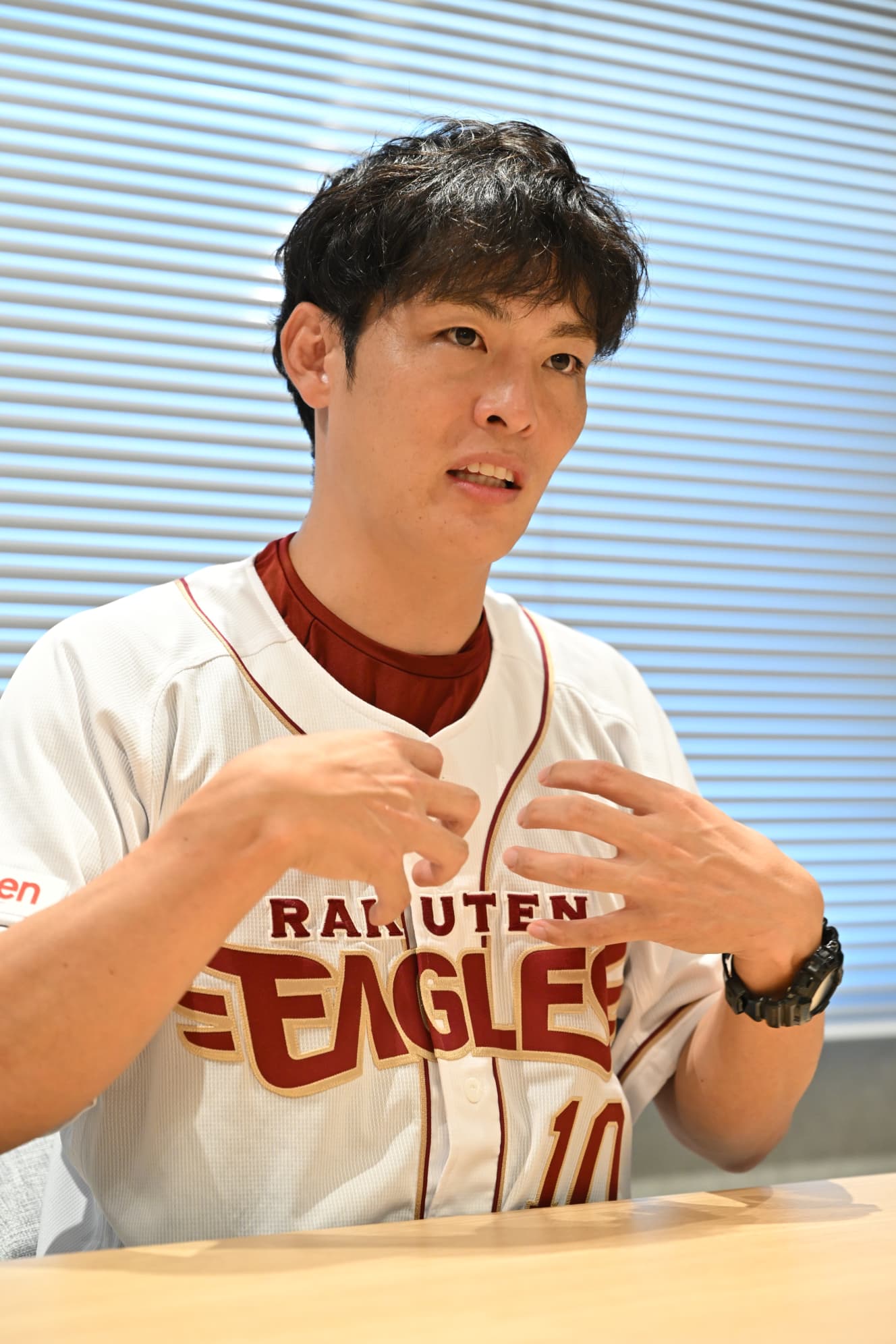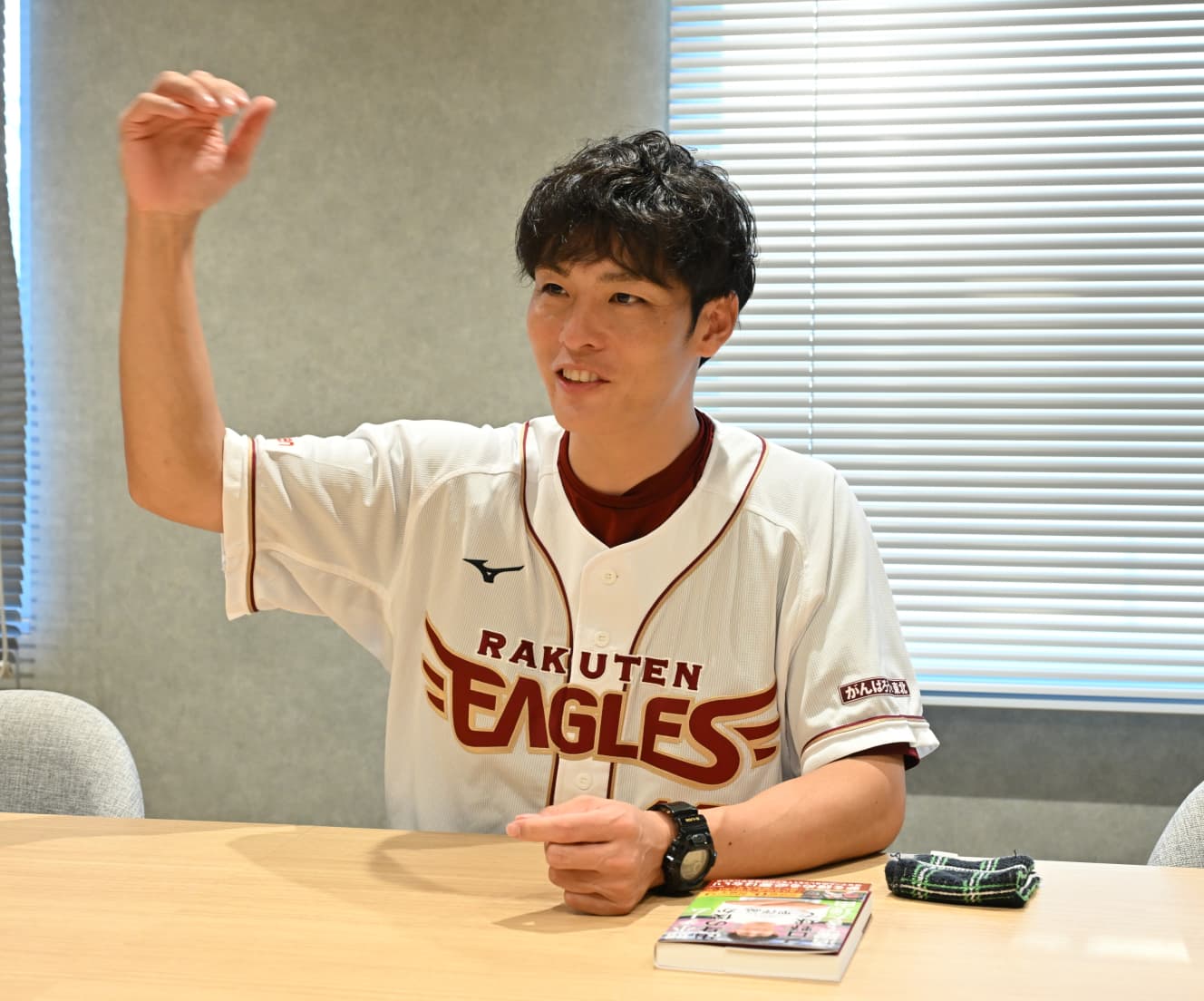Former Rakuten Player Ryo Hirijisawa: Success from a Rare Background
There were no strong baseball schools or coaches.
“Most players who advance to professional baseball come from strong high school teams. Many people think, ‘It’s impossible because I couldn’t go to a strong school’ or ‘I’ll give up on my dreams because there are no coaches.’ I wanted to reduce the number of people who give up for those kinds of reasons.”
Ryo Hijirisawa (38), a former professional baseball player who played as a specialist in running for the Tohoku Rakuten Golden Eagles for 11 years until 2018, is currently coaching elementary and junior high school students at the Rakuten Eagles Academy’s baseball school after retiring from active play. In September, Hijirisawa published his book titled “The Reason I Could Succeed in Professional Baseball Despite Coming from a Weak Team” (published by Tatsumi). He explains that the motivation behind this title stems from his own experiences of not being in an advantageous environment.
“When I was in elementary school, I begged my parents to let me join a local team that practiced for just two hours once a week on Sundays, and the coaches were just neighborhood dads. There wasn’t much formal instruction; they would mainly just throw ground balls. I joined the junior high school baseball club, but the teacher in charge had no baseball experience either, so there was no real coaching there. I loved baseball and wanted to get better and become a player, so I had to figure out how to practice on my own for a long time.”
Nowadays, in similar situations, one could easily find hints or answers by watching YouTube videos. However, that was obviously not an option back then. So, how did Hijirisawa manage?
During his junior high school years, he had 0 wins in official matches, and in the summer of his final year in high school, he lost in the 1st of the prefectural qualifiers.
“I would use books and the movements of players from Giants games, which were broadcasted at the time, as examples to experiment with my own techniques. What I valued most was imagining the opponent and the situation. For instance, when practicing my swings, I would think about what kind of pitcher I was facing and the count and base runners’ situations as I swung the bat.
Even now, when I teach elementary and junior high school students, very few of them practice their swings while imagining the situation or think for themselves during practice. I thought that was a given, but I recently realized that I was actually quite rare in that regard” (laughs).
During his junior high school years, he had zero wins in official matches. Although he was skilled compared to his teammates, he couldn’t advance to a strong baseball school, so he went to his local public school, Matsushiro High School. There were only two classmates on the baseball team.
“The advisor at Matsushiro High School was Hiromi Yanagisawa, who had experience at Koshien and played baseball at Meiji University. Although there wasn’t much coaching, he didn’t suppress my ability to think for myself, saying, ‘Hijirisawa can think for himself and practice.’ However, by the time I entered high school, I had given up on my dream of becoming a professional baseball player. I had never heard of anyone from Matsushiro High School going pro, and I could see the reality of the situation.”
In the spring of his third year of high school, he hit a home run, but his team lost in the first round of the prefectural qualifiers that summer. That marked the end of Hijirisawa’s high school baseball career. However, that home run was featured in a small article in a magazine called “Yakyu Kozo” (now “Yakyu Taro”), which led to Kogakuin University sending information about a selection test to his school. Although Hijirisawa had thought that his baseball journey would end with high school, his coach believed he should go to university.
The reason he became the captain at a prestigious university and then a professional player.
“I was told, ‘Since you went through the trouble of sending an invitation, go watch the university baseball,’ so I decided to participate in the selection. As expected from the prestigious Kokugakuin University of the Tokyo Big Six Baseball League, the selection was filled with about 150 participants, all of whom had experience in Koshien or came from strong high schools.
Until then, I had been the best player on my team, but here I was the worst. The atmosphere of being surrounded by people who were better than me was exciting. I didn’t think, ‘I can’t compete, so I’ll quit.’ When I shared with Coach Toshiyuki Takeda what I had practiced and thought for myself until then, he recognized my potential, and I was able to join the team.”
At that point, I began to consider ‘how the worst player like me could secure a regular spot.’
“It wouldn’t be interesting to remain the worst. I thought, ‘I’ll become better than those with Koshien experience or from strong schools over the next four years!’ At first, I wasn’t even allowed to swing a bat, but while I did tee work and practiced my defense, I watched the techniques of the better players, tried to incorporate that into my practice, and learned as much as I could since I was the worst.
I became a regular earlier than expected, in my second year, and I started to analyze the psychology of my opponents and my own mental state to improve my batting and stealing probabilities. I didn’t necessarily hit a million balls or take countless grounders.”
As he began to make a name for himself at the prestigious university, Hijirisawa became captain in his fourth year, achieving results that placed him second to the top batter in the Tokyo Big Six League, and he was also selected for the Best Nine. According to Hijirisawa, due to the quirks of the draft, he was selected in the fourth round of the university and corporate draft by the Tohoku Rakuten Golden Eagles. Although he finally became a professional baseball player, he faced the reality of the high level of competition that every rookie encounters.
The problem lies in the way of thinking and mental state.
“I participated in a joint voluntary training session in January. When I saw the balls thrown by the current players, they were incredible. If it were Masahiro Tanaka or Hisashi Iwakuma, I could understand that. But these were pitches from players in their twenties with no track record. It was shocking. I started to feel anxious, wondering, ‘Can I keep up?’
However, being afraid of not being able to compete and giving up is not the solution. I thought about how I could stay in the first team and secure a regular position. At that time, Rakuten didn’t have a speed specialist like Yuki Yanagita (of the Fukuoka SoftBank Hawks). Even if my defense and batting were lacking, I could stand out as a special pinch runner, so I focused on showcasing my speed. As a result, I participated in the first team camp and was able to play in the first team from my first year.”
But there were times when I struggled to establish myself in the first team.
“Just like me, there are many players who perform well in the second team and get called up to the first team but can’t deliver results there. The problem lies in their way of thinking and mental state. Even when you get called up to the first team, you can get so nervous that you can only give half of your potential. I thought about what to do.
I was called up because my performance in the second team was recognized. I just needed to play as I did in the second team. The only difference was the environment. In the second team, there might be 100 spectators, but in the first team, there are 20,000. There are also cheers and instruments. I imagined the 20,000 fans as being just about 100, like in the second team, and played calmly, taking advantage of the opportunities.”
At that time, the manager of Rakuten was the late Katsuya Nomura. Nomura’s philosophy of ID baseball was all about ‘thinking baseball!’ The baseball I had been thinking about grew larger and larger.
“Having thoughts and skills—this was something that both Coach Takeda of Kokugakuin and Coach Nomura valued. I believe that in baseball, it is the players who think and possess a high ability to analyze who can thrive in this world.”
Shohei Ohtani had no weaknesses.
In utilizing his speed for stolen bases, while coaches provided information, Hijirisawa was diligent in analyzing the quirks of each pitcher himself. He even paid attention to the wrinkles in his uniform. Generally, taller pitchers tend to have poor quickness and are more likely to reveal their tendencies, making it easier to run against them.
“For instance, during my time with the Hokkaido Nippon-Ham Fighters, Yu Darvish was like that. He didn’t seem to care when I stole second because he was focused on keeping the battery in check.
However, Shohei Ohtani was different. Despite being tall, he had a relatively quick delivery. The risk of allowing runs increases, so he likely didn’t want to give up any bases. He’s perfect—there are no openings. I never attempted to run against him. This season, Ohtani has been running a lot, but I wouldn’t run that much myself. He continues to start games and is a key part of the batting lineup, which puts a lot of strain on his body. The risk of injury also increases. It’s just incredible.”
In 2012, Hijirisawa became the stolen base king and recorded the highest batting average with runners in scoring position among all twelve teams. He contributed as a central figure in the league championship and Japan Series victory in 2013. He also holds the NPB record for consecutive errorless defensive chances as an outfielder, achieving remarkable success as a professional baseball player. At the core of this was a naturally developed methodology of thinking for oneself, which he cultivated since elementary school.
“Entering the professional world is the same as stepping into society. Those who don’t succeed are often the ones who only act based on instructions. What’s necessary is having your own thoughts and thinking for yourself. I want to convey this to the elementary and middle school students I teach in the academy.”
Hijirisawa’s attitude is not just a lesson for baseball players but applies to life in general.






Hijirisawa’s book, in which he thoroughly documents his thinking method, is currently on sale and receiving positive reviews.
PHOTO: Takero Yui
